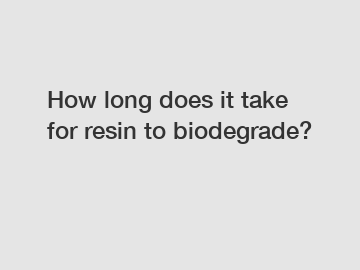How long does it take for resin to biodegrade?
Resin is a material that has become increasingly popular in recent years due to its versatility and durability. It is commonly used in a wide variety of products, from furniture to jewelry, and is often preferred for its ability to mimic the look of natural materials such as wood, stone, or glass. However, one question that often comes up when discussing resin is how long it takes for it to biodegrade.
Biodegradation is the process by which organic materials are broken down by microorganisms into simpler compounds such as carbon dioxide, water, and biomass. This process is essential for maintaining a healthy environment, as it helps to reduce the amount of waste that accumulates in landfills and minimizes the impact on ecosystems.
In the case of resin, which is typically made from synthetic materials such as epoxy or polyester, the biodegradation process can be quite slow. This is because these materials are not easily broken down by microorganisms, as they do not contain the organic compounds necessary for decomposition.

In general, resin products can take anywhere from hundreds to thousands of years to fully biodegrade, depending on factors such as the specific type of resin used, the environment in which it is exposed, and the presence of other chemicals or materials that may inhibit the degradation process.
For example, epoxy resin, which is commonly used in coatings, adhesives, and composites, is known for its durability and resistance to degradation. This is due to its chemical structure, which is highly stable and does not readily break down in the presence of moisture, heat, or light.
Similarly, polyester resin, which is often used in fiberglass and plastic products, is also resistant to biodegradation due to its synthetic nature and lack of organic components. While these materials may eventually break down over time, the process is slow and may not occur within a reasonable timeframe.
In contrast, there are some types of resin that are more biodegradable than others. For example, bio-based resins, which are derived from natural sources such as plants or algae, are designed to be more environmentally friendly and easier to break down.
These resins are often used in sustainable products such as biodegradable plastics, packaging, and coatings, as they can be composted or recycled more easily than traditional synthetic resins. However, even bio-based resins may still take several years to biodegrade completely, depending on the specific conditions in which they are exposed.
It is important to note that while resin may not biodegrade quickly on its own, there are ways to facilitate the process and reduce its impact on the environment. One common method is to recycle resin products, either by reusing them in new applications or by breaking them down into their original components for use in other manufacturing processes.
Additionally, there are biodegradable additives and treatments available that can help accelerate the biodegradation of resin materials. These additives are designed to encourage the growth of microorganisms that break down the resin into smaller, more easily digestible compounds.
By taking steps to recycle, repurpose, or treat resin products, individuals and businesses can minimize their environmental footprint and contribute to a more sustainable future. While resin may not biodegrade quickly on its own, there are ways to mitigate its impact and ensure that it is handled in a responsible and eco-friendly manner.
In conclusion, the length of time it takes for resin to biodegrade depends on a variety of factors, including the type of resin used, the environmental conditions in which it is exposed, and the presence of other materials or additives. While traditional synthetic resins may take hundreds to thousands of years to break down, there are more biodegradable options available that can help reduce the environmental impact of these materials. By being mindful of how we use and dispose of resin products, we can help ensure a cleaner and healthier planet for future generations.
Want more information on pbat compostable, compostable resin, biodegradable plastic bags with logo? Feel free to contact us.


